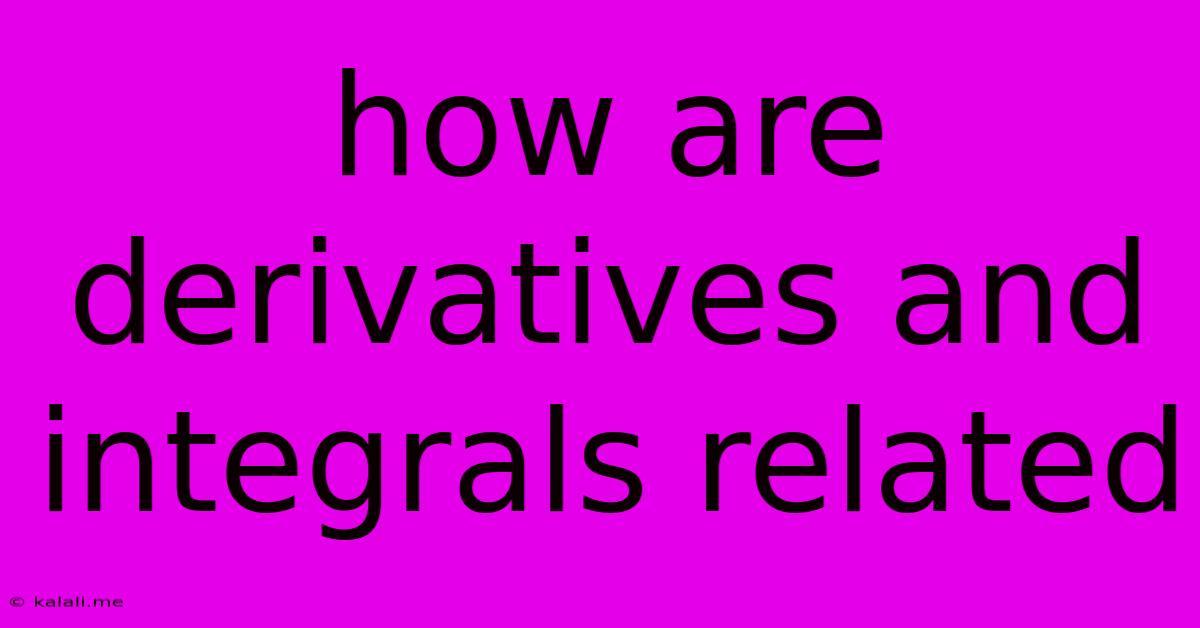How Are Derivatives And Integrals Related
Kalali
Jun 01, 2025 · 3 min read

Table of Contents
The Fundamental Theorem of Calculus: How Derivatives and Integrals Are Related
The relationship between derivatives and integrals is one of the most fundamental concepts in calculus. It's not just a mathematical curiosity; it's the cornerstone of many applications in physics, engineering, economics, and other fields. Understanding this relationship unlocks a deeper understanding of how change and accumulation are connected. This article will explore this crucial link, focusing on the Fundamental Theorem of Calculus and its implications.
What are Derivatives and Integrals?
Before delving into their relationship, let's briefly revisit the definitions:
-
Derivative: The derivative of a function at a point represents the instantaneous rate of change of the function at that point. Geometrically, it's the slope of the tangent line to the function's graph. We denote the derivative of a function f(x) as f'(x) or df/dx.
-
Integral: The definite integral of a function over an interval represents the net signed area between the function's graph and the x-axis over that interval. The indefinite integral, on the other hand, represents the family of antiderivatives of the function. We denote the definite integral of f(x) from a to b as ∫<sub>a</sub><sup>b</sup> f(x) dx.
The Fundamental Theorem of Calculus: The Bridge Between Derivatives and Integrals
The Fundamental Theorem of Calculus elegantly connects these two seemingly disparate concepts. It has two parts:
Part 1: The Differentiation of Integrals
This part states that if we have a function F(x) defined as the integral of another function f(t) from a constant a to x:
F(x) = ∫<sub>a</sub><sup>x</sup> f(t) dt
Then the derivative of F(x) is simply f(x):
F'(x) = f(x)
In simpler terms, differentiation "undoes" integration. This part highlights the inverse relationship between differentiation and integration.
Part 2: The Integration of Derivatives
This part states that if F(x) is an antiderivative of f(x), then the definite integral of f(x) from a to b is given by:
∫<sub>a</sub><sup>b</sup> f(x) dx = F(b) - F(a)
This means that the definite integral can be evaluated by finding an antiderivative and subtracting its values at the limits of integration. This provides a powerful method for calculating definite integrals without resorting to Riemann sums or other approximation techniques. The process of finding an antiderivative is often referred to as integration.
Implications and Applications
The Fundamental Theorem of Calculus has profound implications:
-
Solving Differential Equations: Many problems in science and engineering involve differential equations, which relate a function to its derivatives. The Fundamental Theorem provides a crucial tool for solving these equations, often allowing us to find explicit solutions.
-
Calculating Areas and Volumes: The theorem allows for the efficient calculation of areas under curves and volumes of solids of revolution, vital in fields like physics and engineering.
-
Analyzing Rates of Change: It allows for the analysis of accumulated change over time by connecting the rate of change (derivative) to the total change (integral).
In Conclusion
The Fundamental Theorem of Calculus establishes a powerful and elegant connection between derivatives and integrals, revealing them as inverse operations. This connection underpins much of advanced mathematics and its numerous applications in various scientific disciplines. Understanding this theorem is essential for grasping the full power and beauty of calculus.
Latest Posts
Latest Posts
-
Did Angels Have Sex With Humans
Jun 02, 2025
-
Straining Out Large Aggregate From Concrete Mix Concrete Mix Lab
Jun 02, 2025
-
Why Are London Dispersion Least Soluble
Jun 02, 2025
-
How Long Does It Take To Fuel A Plane
Jun 02, 2025
-
How To Respond To Job Rejection Email
Jun 02, 2025
Related Post
Thank you for visiting our website which covers about How Are Derivatives And Integrals Related . We hope the information provided has been useful to you. Feel free to contact us if you have any questions or need further assistance. See you next time and don't miss to bookmark.